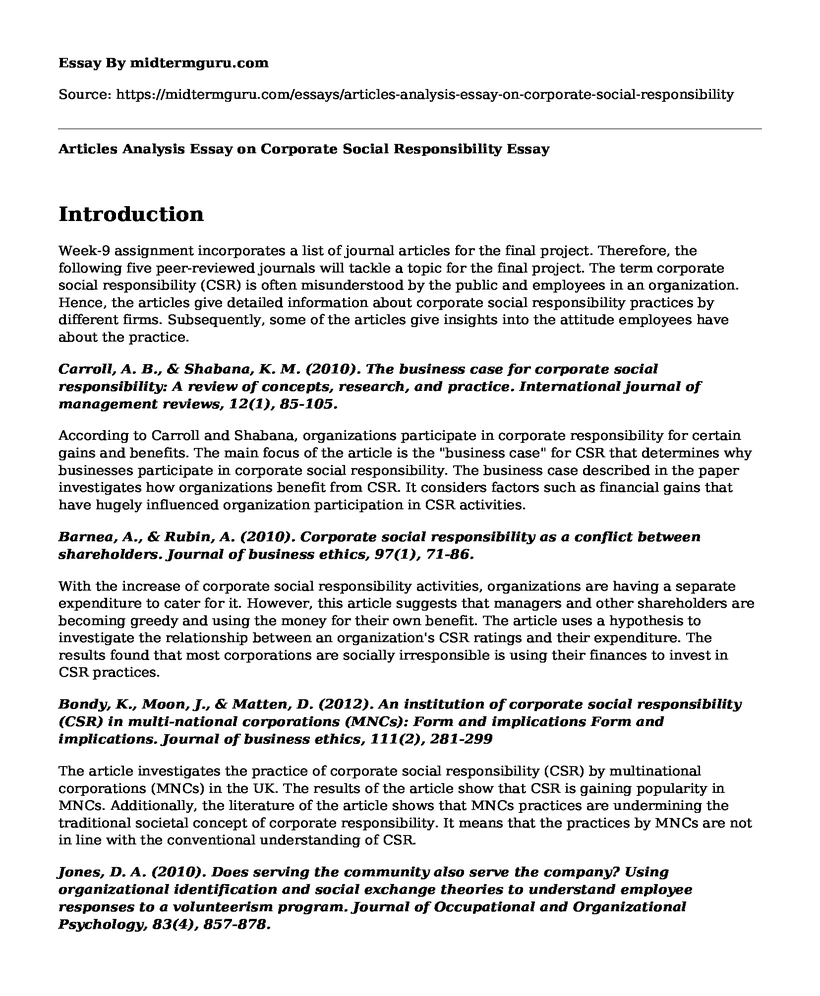Introduction
Week-9 assignment incorporates a list of journal articles for the final project. Therefore, the following five peer-reviewed journals will tackle a topic for the final project. The term corporate social responsibility (CSR) is often misunderstood by the public and employees in an organization. Hence, the articles give detailed information about corporate social responsibility practices by different firms. Subsequently, some of the articles give insights into the attitude employees have about the practice.
Carroll, A. B., & Shabana, K. M. (2010). The business case for corporate social responsibility: A review of concepts, research, and practice. International journal of management reviews, 12(1), 85-105.
According to Carroll and Shabana, organizations participate in corporate responsibility for certain gains and benefits. The main focus of the article is the "business case" for CSR that determines why businesses participate in corporate social responsibility. The business case described in the paper investigates how organizations benefit from CSR. It considers factors such as financial gains that have hugely influenced organization participation in CSR activities.
Barnea, A., & Rubin, A. (2010). Corporate social responsibility as a conflict between shareholders. Journal of business ethics, 97(1), 71-86.
With the increase of corporate social responsibility activities, organizations are having a separate expenditure to cater for it. However, this article suggests that managers and other shareholders are becoming greedy and using the money for their own benefit. The article uses a hypothesis to investigate the relationship between an organization's CSR ratings and their expenditure. The results found that most corporations are socially irresponsible is using their finances to invest in CSR practices.
Bondy, K., Moon, J., & Matten, D. (2012). An institution of corporate social responsibility (CSR) in multi-national corporations (MNCs): Form and implications Form and implications. Journal of business ethics, 111(2), 281-299
The article investigates the practice of corporate social responsibility (CSR) by multinational corporations (MNCs) in the UK. The results of the article show that CSR is gaining popularity in MNCs. Additionally, the literature of the article shows that MNCs practices are undermining the traditional societal concept of corporate responsibility. It means that the practices by MNCs are not in line with the conventional understanding of CSR.
Jones, D. A. (2010). Does serving the community also serve the company? Using organizational identification and social exchange theories to understand employee responses to a volunteerism program. Journal of Occupational and Organizational Psychology, 83(4), 857-878.
The success of an organization's corporate social responsibility practices depends on the reaction of employees. When a company participates in CSR it is difficult to mitigate the reaction of employees. Therefore, this article aims at investigating employees' reaction to CSR by creating a hypothesis. The hypothesis is used to test how employees respond to their firm's CSR either negatively or positively.
Rupp, D. E., Shao, R., Thornton, M. A., & Skarlicki, D. P. (2013). Applicants' and employees' reactions to corporate social responsibility: The moderating effects of first party justice perceptions and moral identity. Personnel Psychology, 66(4), 895-933.
Unlike the previous article which uses a hypothesis, this article uses a multi-motive framework to investigate employee reaction to CSR. The multi-motive study experiments on job applicants and already employed individuals to find out how they responded to CSR practices. The study found that job applicants were willing to participate in CSR because of their moral responsibility. Consequently, employees with high-performance records were more open to voluntary participation activities. Overall the study reveals that moral identity is the sole reason for employee willingness to participate in CSR activities.
Conclusion
In conclusion, the articles and journals all describe corporate social responsibility practices in organizations. Some of the articles are concerned with how firms conduct their CSR activities, thus the numerous research. It is evident that the reaction of employees to the company's CSR practices is difficult to anticipate. Hence, it is better to conduct a study to get concrete evidence on their attitude towards practices such as volunteerism. While CSR is seen to benefit the society, some scrupulous managers are benefiting from the funds set aside to cater for CSR activities.
References
Barnea, A., & Rubin, A. (2010). Corporate social responsibility as a conflict between shareholders. Journal of business ethics, 97(1), 71-86. Retrieved from: https://link.springer.com/article/10.1007/s10551-010-0496-z
Bondy, K., Moon, J., & Matten, D. (2012). An institution of corporate social responsibility (CSR) in multi-national corporations (MNCs): Form and implications. Journal of business ethics, 111(2), 281-299. Retrieved from: https://link.springer.com/article/10.1007/s10551-012-1208-7
Carroll, A. B., & Shabana, K. M. (2010). The business case for corporate social responsibility: A review of concepts, research, and practice. International journal of management reviews, 12(1), 85-105. Retrieved from: https://onlinelibrary.wiley.com/doi/abs/10.1111/j.1468-2370.2009.00275.x
Jones, D. A. (2010). Does serving the community also serve the company? Using organizational identification and social exchange theories to understand employee responses to a volunteerism programme. Journal of Occupational and Organizational Psychology, 83(4), 857-878. Retrieved from: https://onlinelibrary.wiley.com/doi/abs/10.1348/096317909X477495
Rupp, D. E., Shao, R., Thornton, M. A., & Skarlicki, D. P. (2013). Applicants' and employees' reactions to corporate social responsibility: The moderating effects of firstparty justice perceptions and moral identity. Personnel Psychology, 66(4), 895-933. Retrieved from: https://onlinelibrary.wiley.com/doi/abs/10.1111/peps.12030
Cite this page
Articles Analysis Essay on Corporate Social Responsibility . (2022, Sep 14). Retrieved from https://midtermguru.com/essays/articles-analysis-essay-on-corporate-social-responsibility
If you are the original author of this essay and no longer wish to have it published on the midtermguru.com website, please click below to request its removal:
- Essay on Tensions Between Creativity and Power
- Essay on Organizational Conflict and Conflict Management: Diversity and Conflict
- Persuasive Speeches on Education Planning Form Paper Example
- Essay Sample on Leadership Skills of Winston Churchill
- Paper Example on Characterizing a Typical User of the Product
- The Success of an Organization: Balancing Stakeholder & Management Roles - Essay Sample
- Article Analysis Essay on Decision Making With the Analytic Hierarchy Process







